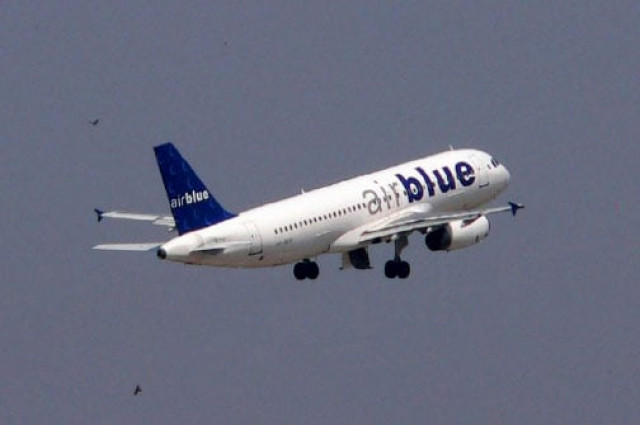Mayday, Mayday!: Airlines rethink strategy after fuel price hike
Airblue in distress as employees strike after management’s hasty proposals.

Over a dozen of Airblue flights were delayed on Sunday with hundreds of passengers stranded across the country as employees went on a temporary strike as they got to know about management’s impending decision.
It was a matter of ten rupees that sent the management of a private airline scrambling to rethink business strategy in an overnight meeting, proposing a cut in salaries and then facing a backlash from angry employees who went on a daylong strike. Everything happened in a matter of hours.
Over a dozen of Airblue flights were delayed on Sunday with hundreds of passengers stranded across the country as employees went on a temporary strike as they got to know about management’s impending decision.
Company’s spokesperson Raheel Ahmed put the number of delayed flights to five. He would not comment on the exact reasons behind the delay but insisted it was due to operational matters. The flights resumed later in the night.
A sudden surge of Rs10 per litre in JP-1 jet fuel price to Rs99.88 from September 1 threatens to erode the already thin margins of Pakistani carriers, which are battling to control runaway costs, industry officials say.
“This increase is too much for the airlines,” said a senior Civil Aviation Authority (CAA) official who was briefed by Airblue on the issue. “Except for Pakistan International Airlines (PIA), all the airlines will be hit. The national carrier has the government to rely upon.”
The official said that Airblue initially considered slashing workforce by 20% but later decided to bring down salaries of all the employees until it comes up with some strategy.
“Somehow the engineers of the airline got wind of the proposal and they went on a strike. You must remember that these are ex-PIA engineers who have labour-militant mentality. Let’s see what happens,” he said.
Petroleum minister Shahid Khaqan Abbasi who has a stake in Airblue refused to comment on the matter, but officials say he is also involved in the deliberations to resolve the crisis.
Another airline official said the impact of Rs10 is substantial if consumption of jet fuel by airlines is considered. An average one-way flight from Karachi to Islamabad uses 2.2 tons or 2,827.44 litres of fuel, he said. “Simple calculation will tell you the kind of impact we are anticipating.”
Airline officials estimate additional impact of in excess of Rs50 million every month. Airblue operates around 30 daily flights on an average day.
Industry officials say Airblue’s management is the most efficient among the four domestic airlines.
“That is the reason they were quick to grasp the entire situation,” said one official. “But trouble is in store for them even with such a lean staff. This is the irony of the airline business – costs are always too high.”
While airlines will increase fuel surcharge component in the airfare, officials know they cannot pass on the entire cost without hurting occupancy rates, a senior airline executive says.
“The government will have to intervene in the market if it wants to see domestic airlines flourish,” he said, pointing out that the options for Pakistani travellers were already limited. “If fuel keeps on rising like this, it will kill one of the carriers in a matter of months.”
The CAA should take a cut in its revenue by bringing down its charges like landing and airport fee to give the airlines a breathing space, he said. “Our airlines don’t have the financial muscle like international counterparts to hedge the fuel cost,” he said.
Published in The Express Tribune, September 3rd, 2013.
Like Business on Facebook, follow @TribuneBiz on Twitter to stay informed and join in the conversation.



















COMMENTS
Comments are moderated and generally will be posted if they are on-topic and not abusive.
For more information, please see our Comments FAQ